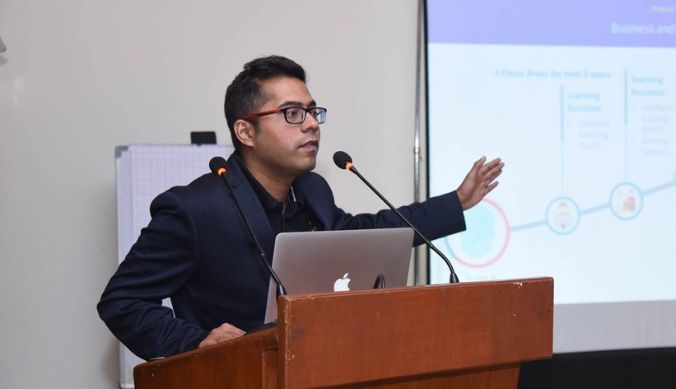#AshokaBookTower – ‘A Ballad of Remittent Fever’ – translated by Prof Arunava Sinha, the book is a stunning exploration of the world of medicine and of prevailing rationality against blind belief
Written in Bengali as Awbiram Jawrer Roopkawtha, the book encapsulates tales of love, loss, hope, morality and everyday miracles performed by medical professionals.

Office of PR & Communications
18 September, 2020 | 6 min readSynopsis:
In the early years of the twentieth century, Calcutta is grappling with deadly diseases such as the plague, cholera, typhoid, malaria, and kala-azar. The populace is restive under British rule as World War I looms large on the horizon. Set against this backdrop, is an indelible tale of loss, hope, love, and mortality.
Dr Dwarikanath Ghoshal is propelled by a fierce desire to vanquish the diseases that ravage the population. He does not hesitate to dismiss quackery, superstition, and old-fashioned beliefs that have contributed to the spread of infectious diseases.
Four generations of Ghoshals continue to infuse their scientific temper and liberal values into the lives of people around them. There is Dwarikanath’s headstrong son, Kritindranath Ghoshal, who joins the Bengal Ambulance Corps and sets off for the battlefield in Mesopotamia during World War I. There is also his soulmate, Madhumadhabi, who trains to be an Ayurvedic doctor, and is heartbroken when Kritindranath is married off.
Equally compelling are Dwarikanath’s wife, Amodini, his grandson, his great-grandson, and a myriad other brilliantly imagined characters who play out their lives in the course of the novel, fighting diseases, social mores, and trying to cope with the enormous, convulsive changes the city is experiencing.
Distinctive and beautifully wrought, A Ballad of Remittent Fever is a stunning exploration of the world of medicine and the ordinary miracles performed by physicians in the course of their daily lives. Originally published in the Bengali as Abiram Jwarer Roopkatha, this is one of the most original novels to have come out of India in the twenty-first century.
In conversation with the translator, Arunava Sinha, Associate Professor of Practice in Creative Writing.
Please give an insight into the book A Ballad of Remittent Fever.
The novel is the English translation of a Bengali novel titled ‘Awbiram Jawrer Roopkawtha’ by Ashoke Mukhopadhyay. It span about 70 years of public and private lives in Calcutta and Bengal from the last decade of the 19th century till the 1960s. Four generations of the Ghoshal family of Calcutta are featured, three of them with doctors. The stories – and there are many – revolve around the efforts of these doctors as they battle disease, hygiene or the lack of it, superstition and a refusal to believe in modern medicine amongst people at large.
The three doctors featured here are quite different from one another. The eldest is idealistic, trying to break new ground, and is quite a patriarchal figure. His son is a truly eccentric character who cannot stay in one place and wanders around the country. He is in love with his cousin, who is an Ayurvedic doctor herself, which complicates matters. And this man’s grandson is a modern doctor who is fighting illness and disease against the backdrop of overpopulation, urban poverty, and political upheaval.
Their lives intersect in time and in the common space of Calcutta, giving us a most intricate and yet sprawling world of public health and personal medicine – and above all, of hard rationality against blind belief.
What was the inspiration behind translating the book?
The idea behind translating it was the same as with almost any book I translate. Translation, along with teaching, is my primary mission, and I pick books that, I feel, people across the country and the world will enjoy reading.
In this case, I was particularly interested because this novel is an alternative view of the history of Calcutta and of Bengal, seen through the lens of medicine and public health, which makes for a fascinating example of writerly imagination.
“Distinctive and beautifully wrought, A Ballad of Remittent Fever is a stunning exploration of the world of medicine and the ordinary miracles performed by physicians in the course of their daily lives”. Your comment.
“The need for ordinary miracles performed by physicians in the course of their daily lives” has probably never been greater than in the world we live in right now. The coronavirus pandemic has brought home to us the reality of the world that this book inhabits. While we all wish that that were not the case, this book becomes all the more poignant, all the more real, and most important, a source of hope in our times.
In today’s time when the world is struggling to survive amidst the pandemic, the relevance of ‘A Ballad of Remittent Fever’ seems to be even more ironic. Your comment.
Both the author as well as the translator would happily have forsaken the relevance that this novel suddenly seems to have acquired. We would much rather that the book was read at a different time. The irony is unmistakable, and unwanted. But since we cannot defy or deny reality, maybe we can build this novel into it.
Please give our readers a sneak peek into the JCB Prize for Literature 2020 for which the book was longlisted.
The JCB Prize for Literature is an impactful addition to the line-up of awards in India. It is modelled in some ways on the Booker Prize, especially in terms of the seriousness that it tries to bring to literary awards. And unlike the Booker, it considers translations as well as works originally written in English.
Any anecdote while translating the book that you wish to share.
Translating this book was scary in a way because it goes so deep into the experience of illness – of falling ill and being ill – as well as of the treatment, including surgery in primitive conditions that can make even the steeliest nerves quiver. It also reminded that mortality was very much a part of everyday life till recently, and that the medical treatment some of us take for granted nowadays did not always exist.
Would you like to talk a little about your current and future projects?
I translate all the time. If I finish translating a book at 6 o’clock, I start the next one at 6:10 after a cup of coffee! So there is always work in progress. There are about three or four books which I finished translating recently that are currently lying with publishers and will be coming out over the next year or so. Some of them have been delayed because of the pandemic, which has pushed publishing programmes back.
Right now, I am in the middle of translating a fascinating novel written in the first person by Bangladeshi writer who lives in Australia. Titled Hospital, it is a first-person account, by a woman who has the same name as the writer’s, of a relapse into psychosis, simulating a real-time account. It is not melodramatic or high-pitched, and its narrative seems surreal even in today’s world with our heightened awareness of the delicate state of physical and mental health all round.
Anything else you would like to share.
It is a great joy for me personally that I can actually combine my translations with my teaching in the creative writing department at Ashoka. This programme, which offers an ungraduated minor and a component of an interdisciplinary major is, I daresay, one-of-a-kind in India in the manner in which it combines pedagogy with the practical experience of experienced writers to teach creative writing. The impact of the courses is evident in the growing number of students taking them.
To know more about Arunava Sinha, click here. You can follow his work here.
Reviews of A Ballad of Remittent Fever
“An unusual saga of contagion matched by a powerful translation.” – The Hindu (September 2020)
“In its English translation, Arunava Sinha does an absolutely brilliant job of making us forget that we are, in fact, reading it in English, and not the original Bangla. And it’s a testament to his skill that the import and the meaning isn’t as they say ‘lost in translation’. It is a saga of courage and healing.” – The New Indian Express (May 2020)
“A Ballad of Remittent Fever isn’t about overcoming the fear of death; it’s about a deep love of life, and the curiosity and stubbornness of a profession that nurtured this love.” – Mumbai Mirror (April 2020)
About #AshokaBookTower
The newly launched #AshokaBookTower campaign will showcase books written by our faculty and staff. The campaign aims to highlight the rich variety of subjects and intensive scholarship these books represent. An in-depth conversation with the author will also give a glimpse into what went into the writing of the book. This will be a recurring affair and will highlight some of the newest launches as well as the old collection.
Do follow us on social media (Facebook | LinkedIn | Twitter | Instagram) to know more about the campaign!













